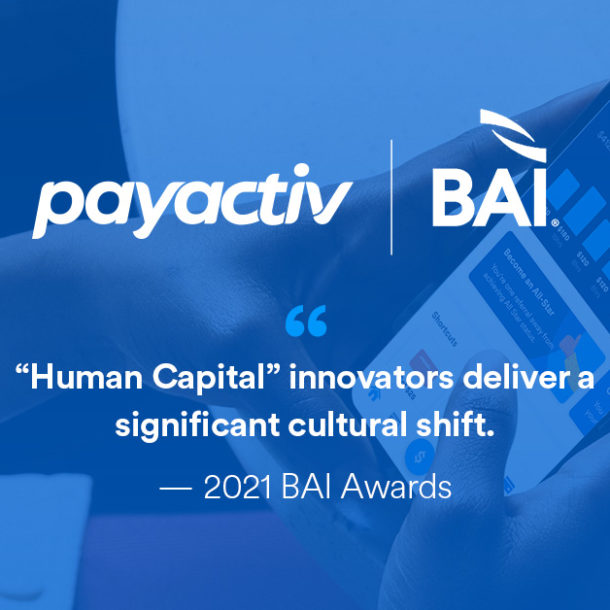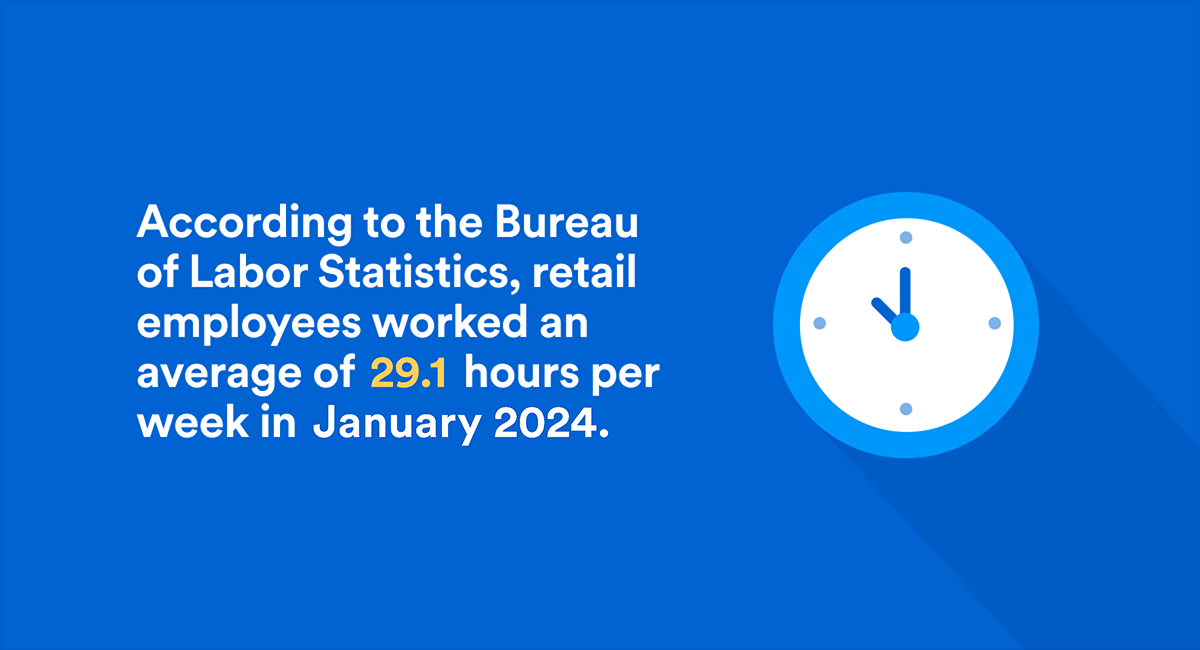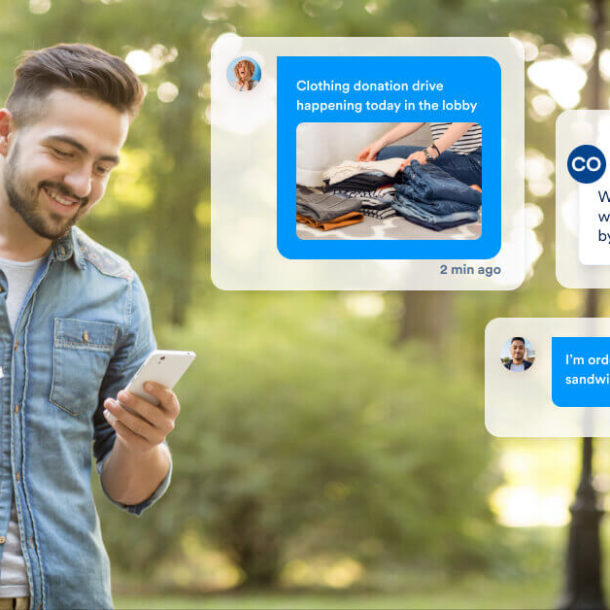
How Many Hours Do Retail Workers Work?
Retail workers fulfill a critical role in the economy. They’re the folks that help you find and purchase goods in stores. They’re also the ones working in back offices or warehouses, ensuring the steady flow of merchandise in and out of retailers’ facilities. But how many hours do retail workers work exactly? And what do their shift schedules typically look like? In this article, we’ll explore more about the different types of working arrangements of typical retail employees, scheduling best practices in retail, as well as the benefits and drawbacks of employment in this sector.
How Many US Employees Are Retail Workers?
There are approximately 4 million people in the US working in retail, and the average hourly rate paid to these workers is $16.30 per hour. In 2024, average retail working hours fell to 29.1 in January from 30.2 the previous year, according to the Bureau of Labor Statistics.

Understanding Full-Time vs. Part-Time Hours in Retail
Given that many consumer retailers keep their doors open most of the day – and some even 24 hours – many customer-facing retail workers work non-standard hours, including evenings, nights, and weekends. A fair portion of retail employees work part-time. But what exactly do we mean by “part-time worker?”
As the term suggests, part-time workers work fewer hours than their full-time counterparts. This working arrangement has an interesting history.
In 1940, Congress amended the Fair Labor Standards Act (FLSA) to limit the workweek to 40 hours. Before long, this became the accepted standard for differentiating between full and part-time work.
However, the distinction between full-time and part-time employees isn’t all that clear:
- The Fair Labor Standards Act (FLSA) doesn’t address or define a part-time employee.
- However, the Bureau of Labor Statistics claims part-time employees work fewer than 35 hours per week while full-time employees work more than 35 hours a week.
- The IRS says part-time employees work fewer than 30 hours a week or 130 hours per month, and full-time employees work at least 30 hours per week or 130 hours per month.
Definitions (or lack thereof) aside, we can conclude that part-time workers usually work less than 35 hours per week. However, it’s important to note that certain part-time employees might work less than 10 hours per week. Others could work 15 hours one week and 25 the next, depending on the arrangement they have with their employer.
Additionally, people employed in full-time roles aren’t prohibited from working more than 40 hours per week, but they’re entitled to overtime pay if they do.
The Advantages of Working in Retail
There are several compelling reasons why people are drawn to work in retail environments. Let’s take a closer look at some of the main attractions:
1. Regular Physical Movement
Anyone who works in a desk job will tell you that such roles can negatively impact their comfort and well-being unless they’re careful. People who sit for long hours are prone to eye fatigue, back and neck pain, and lower overall energy levels.
Retail employees, on the other hand, generally enjoy a greater level of physical movement. That’s because they’re usually moving around the store, walking, or reaching. This can contribute to better overall health.
2. Discounts on Goods and Merchandise
Many retailers offer their employees staff discounts on goods and merchandise.
The nature and value of these discounts will vary among retailers, but the amount is typically 10–30% off the regular price.
3. Social Interaction
It’s easy for desk-bound employees to start feeling a little isolated in their day-to-day roles (especially now that many are working at least partially remote.)
Retail work, in contrast, gives people the opportunity to interact with customers and colleagues face-to-face every day. Not only does this make the job more enjoyable, but it’s also an effective means to improve one’s interpersonal skills.
4. Growth Opportunities
Anyone who thrives working in a retail environment can look forward to exciting growth and development opportunities.
For example, it’s not uncommon for a customer service representative to progress to the role of team leader and then to assistant store manager within a few years.
The Downsides of Retail Work
1. Relatively Low Pay
Many retail jobs – particularly those offered to people with little or no experience – don’t come with the highest wages; minimum wage offers aren’t uncommon.
That being said, those working in certain retail roles do have the opportunity to supplement their regular wages with tips from customers.
2. Retail Employee Shifts: Working Over Weekends and Holidays
By their nature, retail outlets are generally busier over weekends and holidays, which means that most of their employees must work shifts on these days from time to time.
This can strain the employee’s relationship with their loved ones as their work schedule can infringe on their time together.
3. High Staff Turnover
Like other service industries, the retail sector generally has a higher average employee turnover rate than other sectors.
In some cases, this can negatively impact the sense of teamwork and community in the workplace.
4. A High-Pressure Environment
We all know the saying “the customer is always right.” Many people who work in the retail industry are in customer-facing roles and will inevitably encounter situations where they must deal with difficult customers.
Of course, we all have the odd bad day when it’s challenging to maintain a cheerful face and pleasant disposition.
The Impact of Shift Scheduling on Retail Workers’ Earnings
Shift scheduling in retail can significantly impact a worker’s earnings by directly influencing the number of hours worked, with unstable or unpredictable schedules often leading to fluctuating income due to varying shift lengths and days worked, ultimately causing income volatility.
One way to mitigate these effects is to give retail workers an easy way to pick up extra shifts or swaps shifts with a colleague. For example, Payactiv’s communication app allows employees to access the company’s shift management system, so they can see available shifts or who they might be able to swap shifts with if they find themselves in a tight spot at short notice.
Benefits of Flexible Work Hours for Retail Employees
Providing your workers with shift scheduling flexibility fosters a sense of equity. By fairly distributing less-desirable shifts (such as nights and weekends), no worker feels hard done by. This approach means your frontline employees share the workload, which helps prevent burnout and increases employee satisfaction. This is likely to result in improved retention and lower turnover rates.
Embracing technology to manage the shift scheduling process allows for smooth, streamlined retail operations while nurturing a happier and more productive workforce.
Other Ways to Grow Your Retail Value Proposition
In a labor market experiencing unprecedented skills shortages, many retail business owners are seeking ways to make their company a place where people want to work.
Offering payment flexibility is one approach that’s growing in popularity among employers and employees alike. Specifically, Earned Wage Access (EWA) services – such as that offered by Payactiv – are an increasingly common element of benefits packages. Essentially, EWA allows employees to access pay they’ve accrued but not yet received.
Learn more about how Payactiv can help you increase retail job flexibility or book your demo now.
Get Payactiv for your business
Related Articles
The heart of every business is its employees, and these employees need to be...
February is Black History Month, a time to honor the rich history, vibrant...
If you are looking to offer on-demand pay to your employees, then we've got you...
© 2025 Payactiv, Inc. All Rights Reserved
24 hour support: 1 (877) 937-6966 | [email protected]
* The Payactiv Visa Prepaid Card and the Payactiv Visa Payroll Card are issued by Central Bank of Kansas City, Member FDIC, pursuant to a license from Visa U.S.A. Inc. Certain fees, terms, and conditions are associated with the approval, maintenance, and use of the Card. You should consult your Cardholder Agreement and the Fee Schedule at payactiv.com/card411. If you have questions regarding the Card or such fees, terms, and conditions, you can contact us toll-free at 1-877-747-5862, 24 hours a day, 7 days a week.
** Central Bank of Kansas City does not administer, nor is liable for earned wage access.
Apple and the Apple logo are trademarks of Apple Inc., registered in the U.S. and other countries. App Store is a service mark of Apple Inc., registered in the U.S. and other countries.
Google Play and the Google Play logo are trademarks of Google LLC.
Galaxy Store and the Galaxy Store logo are registered trademarks of Samsung Electronics Co., Ltd.




